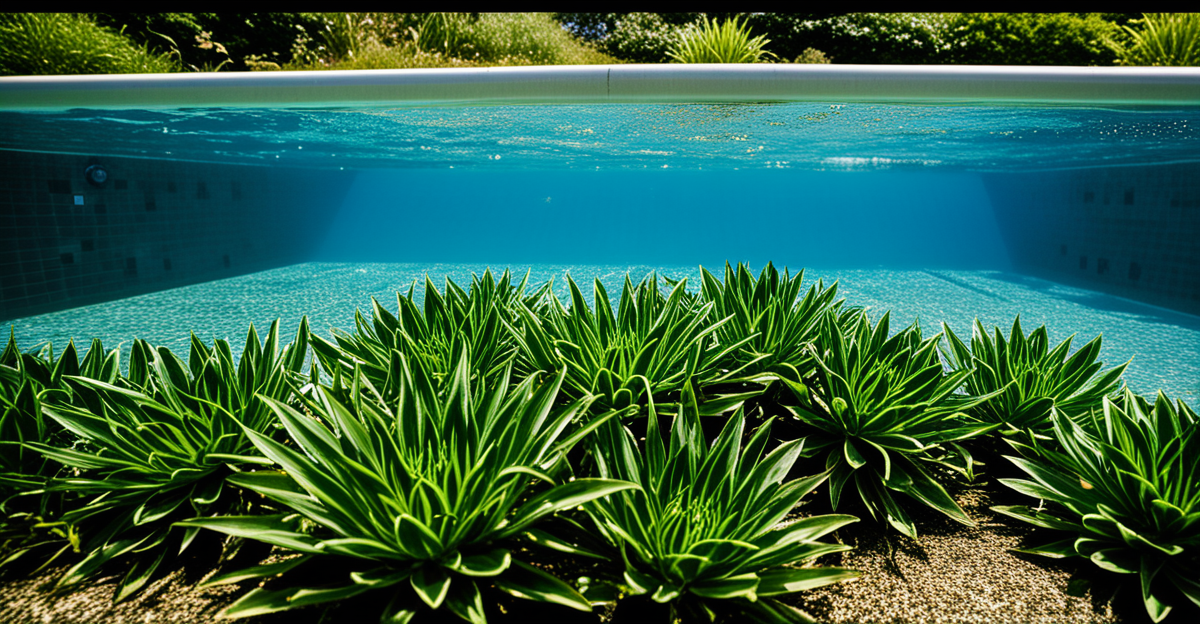How Aquatic Plants Improve Water Quality in UK Swimming Pools
Aquatic plants play a crucial role in natural pool filtration, significantly enhancing pool water quality. They act as biological filters, absorbing excess nutrients like nitrates and phosphates that would otherwise fuel algae growth. This process helps reduce the need for chemical treatments, promoting a more eco-friendly and balanced swimming environment.
By incorporating aquatic plants, pools benefit from clearer water through natural purification. The plants’ root systems foster beneficial microbial communities, which break down organic matter and contaminants. This suppression of algae growth not only improves water clarity but also maintains ecological balance within the pool ecosystem.
Have you seen this : Sustainable pool drainage solutions for uk homeowners: creative tips and eco-friendly techniques
Additionally, aquatic plants contribute to oxygenation, further supporting a healthy aquatic environment. As a result, pool water quality improves sustainably, with less reliance on harsh chemicals. Choosing the right aquatic plants tailored to your pool’s conditions maximizes these natural filtration benefits, ensuring both aesthetic appeal and superior water quality in UK swimming pools.
Choosing the Right Aquatic Plants for the UK Climate
Selecting the best aquatic plants UK for your swimming pool depends heavily on local climate factors such as temperature, sunlight, and pool design. Climate-adapted water plants thrive in cooler, temperate conditions typical of the UK, ensuring they survive seasonal fluctuations and contribute effectively to natural pool filtration and pool water quality.
This might interest you : Ultimate guide to safe pool chemical storage for uk homeowners: must-know tips
Hardy species like water lilies, pondweeds, and certain reeds suit UK pools well, balancing aesthetic appeal with functional benefits. These pool plant species are chosen for their ability to withstand cooler water temperatures and variable sunlight, conditions common in the UK.
When choosing plants, consider the pool’s sun exposure—full sun supports sun-loving species, while shaded pools require shade-tolerant plants. Pool depth and margins also influence plant selection, as some species thrive floating on the surface, whereas others root in shallow edges.
Combining multiple aquatic plants improves visual interest and enhances natural filtration by diversifying the microbial communities they support. Thoughtful plant combinations help sustain ecological balance while maintaining crystal-clear pool water quality throughout the year.
Advantages of Natural Aquatic Filtration Systems in Swimming Pools
Natural pool filtration using aquatic plants offers distinct benefits over traditional mechanical or chemical methods. These plants efficiently remove excess nutrients, such as nitrates and phosphates, directly from the water. Their uptake suppresses algae growth, which is a common cause of murky and unhealthy pool water quality. This nutrient absorption reduces reliance on harsh chemical treatments, promoting a safer and more eco-friendly swimming environment.
Beyond nutrient uptake, aquatic plants foster robust microbial communities around their roots. These microbes degrade organic debris and contaminants, enhancing filtration efficiency and water clarity. The symbiosis between plants and microbes creates a self-sustaining system that mimics natural ecosystems.
Compared to conventional filtration, natural aquatic filtration systems require lower maintenance and result in reduced chemical costs over time, making them economically attractive. Plus, by stabilizing the pool’s biological balance, these plants improve overall swimming conditions, minimizing irritants such as chlorine residues. Embracing aquatic plants for natural pool filtration thus not only enhances pool water quality but also supports healthier, more enjoyable swimming experiences with less environmental impact.
How Aquatic Plants Improve Water Quality in UK Swimming Pools
Aquatic plants are essential to enhancing pool water quality through effective natural pool filtration. They absorb harmful nutrients like nitrates and phosphates, which are major contributors to algae blooms. By reducing these nutrients, aquatic plants help suppress algae growth, resulting in clearer, healthier water.
Moreover, these plants promote ecological balance by supporting beneficial microbial populations around their root systems. These microbes further break down organic pollutants, boosting filtration beyond nutrient absorption. This symbiotic relationship strengthens the overall health of the pool ecosystem.
A key advantage of using aquatic plants is the decreased reliance on chemical treatments. Chemical reductions not only protect swimmers from irritants but also lower environmental impact and maintenance costs. Oxygenation provided by aquatic plants improves water quality and encourages a more stable and natural pool environment.
In summary, aquatic plants improve pool water quality by filtering excess nutrients, controlling algae, and fostering a balanced ecosystem, making them invaluable for sustainable and eco-friendly swimming pools in the UK.
How Aquatic Plants Improve Water Quality in UK Swimming Pools
Aquatic plants significantly enhance pool water quality through natural pool filtration by directly absorbing excess nutrients such as nitrates and phosphates. These nutrients commonly trigger algae growth, which clouds water and harms swimming conditions. By removing these nutrient sources, aquatic plants effectively reduce algae proliferation, ensuring clearer and healthier water.
Furthermore, aquatic plants support a balanced aquatic ecosystem by fostering beneficial microbial communities around their roots. These microbes work synergistically with the plants to break down organic matter and contaminants that would otherwise degrade water quality. This natural cleaning process surpasses simple filtration, renewing the water at a microscopic level.
One major advantage of this system is the reduced dependence on chemical treatments. This not only lessens chemical residues that often irritate swimmers’ skin and eyes but also minimizes environmental impacts typical of conventional pool maintenance. Additionally, aquatic plants contribute to improved oxygenation, which stabilizes the pool environment and discourages harmful bacterial growth.
Together, these mechanisms demonstrate why using aquatic plants is a sustainable and efficient method for maintaining superior pool water quality in UK swimming pools through eco-friendly natural pool filtration.
How Aquatic Plants Improve Water Quality in UK Swimming Pools
Aquatic plants are fundamental to natural pool filtration, significantly enhancing pool water quality by reducing chemical dependency. These plants absorb excess nutrients such as nitrates and phosphates, which are primary contributors to algae growth. By limiting these nutrients, aquatic plants suppress algae proliferation, maintaining clearer and healthier water without relying heavily on chemicals.
The natural filtration process provided by aquatic plants fosters a balanced aquatic ecosystem. Roots support beneficial microbes that further decompose organic pollutants, amplifying water purification beyond nutrient uptake alone. This symbiotic relationship helps sustain a stable ecological environment within the pool.
Reducing chemical reliance is crucial for swimmer comfort and environmental health. Chemical-free pools minimize irritants often caused by chlorine and other treatments, offering gentler swimming conditions.
Moreover, aquatic plants enhance water clarity by controlling algae and organic debris, enabling more natural, eco-friendly pool maintenance. This sustainable approach meets the growing demand for eco-friendly pools that combine beauty with functionality, particularly suited to the UK’s climate and ecological considerations.
How Aquatic Plants Improve Water Quality in UK Swimming Pools
Aquatic plants enhance pool water quality primarily through natural pool filtration, which improves water clarity without heavy chemical use. These plants absorb excess nutrients like nitrates and phosphates that typically encourage algae growth. By reducing these nutrient levels, aquatic plants suppress algae proliferation, keeping the water clear and safe for swimming.
This natural filtration creates a balanced aquatic ecosystem. Around plant roots, beneficial microbes thrive, breaking down organic matter and contaminants beyond nutrient absorption alone. This microbial activity complements filtration, maintaining the pool’s ecological stability and preventing disruptive algae blooms.
Furthermore, incorporating aquatic plants lessens chemical reliance. Reduced use of traditional chemicals lowers swimmer irritation and environmental harm, aligning with eco-friendly pool maintenance trends. Oxygenation from these plants also supports microbial health and discourages harmful bacteria, bolstering water quality sustainably.
In essence, aquatic plants work as living filters in UK pools, combining nutrient uptake, microbial partnership, and oxygenation to enhance pool water quality effectively and naturally through natural pool filtration. This approach offers a gentle, efficient alternative to chemical treatments, ideal for maintaining clear, healthy swimming water year-round.










